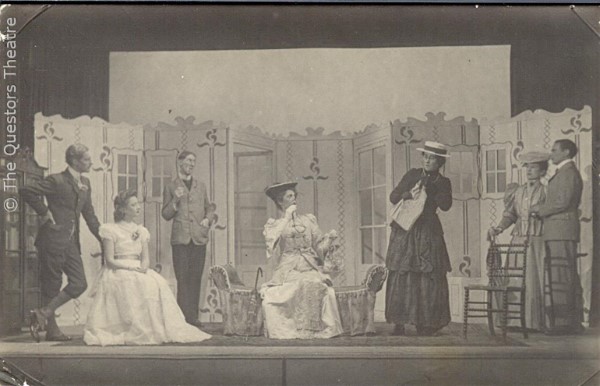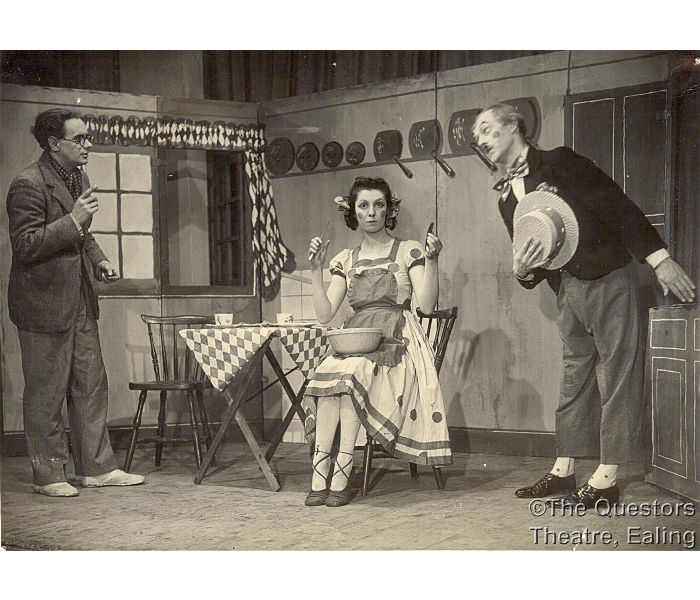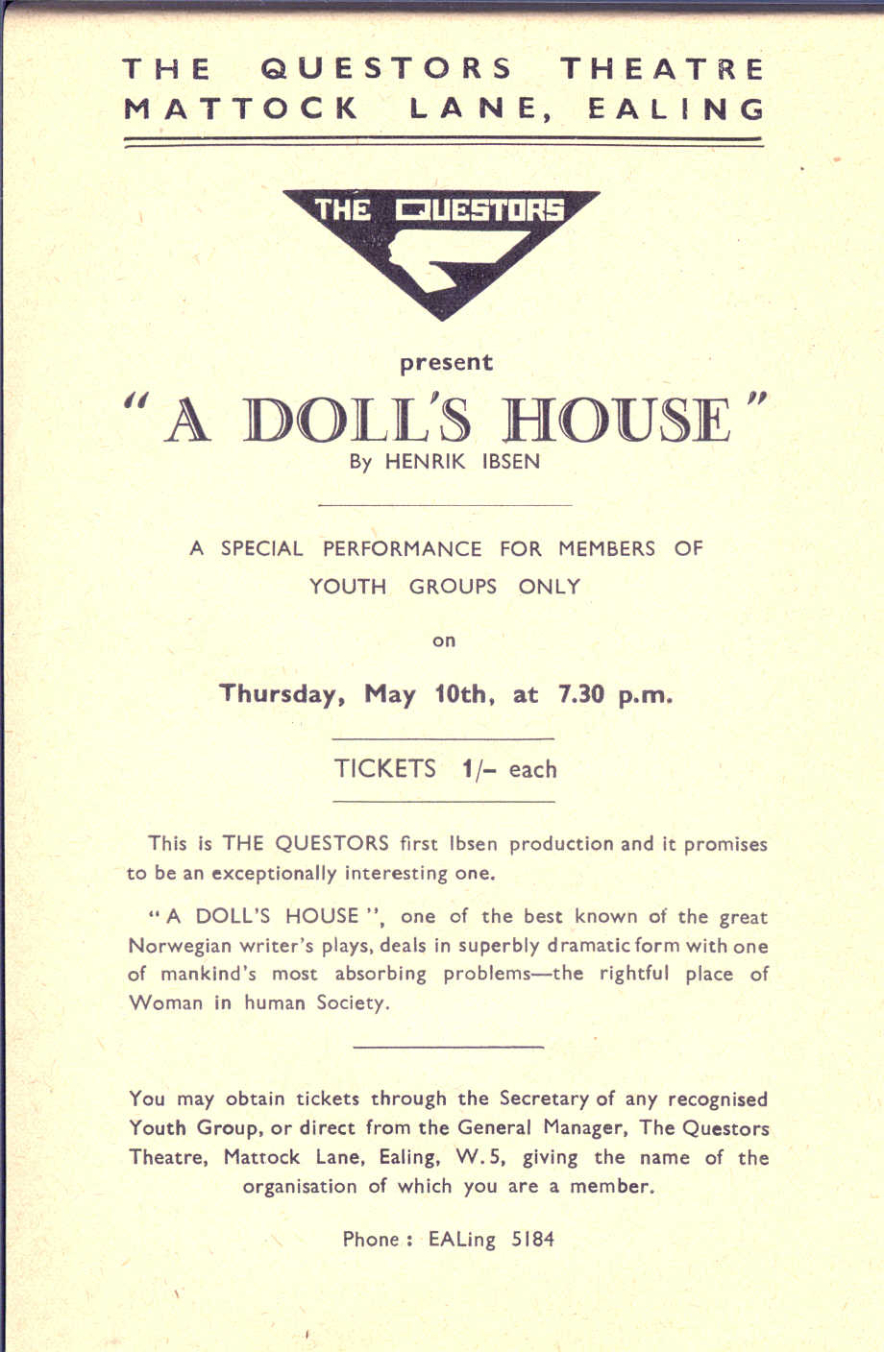
Comedy Contrasts
The Rivals
A Doll's House
October 1944
THE IMPORTANCE OF BEING EARNEST
by Oscar Wilde
Directed by Barbara Hutchins.
Designed by Barbara Hutchins & Fred Robinson
As part of the war effort The Questors was busy around this time organising travelling shows to youth groups, social clubs, ARP stations etc .

THE IMPORTANCE OF BEING EARNEST was no exception. In addition to it's standard run in Mattock Lane the production visited at least five other venues in and around Ealing (including the Association of Engineering and Shipbuilding Draughtsmen!).
On one occasion it was taken to a gun site in Wormwood Scrubs. Alfred Emmet relates: "The performers had to share the stage with a couple of camp cats, who behaved impeccably to begin with, sitting one on either side of the stage. As the play progressed, they began to move about and had to be accommodated in the action, one having to be removed from a chair before John Worthing could sit down!"
Alfred Emmet's after show remarks in the Members' News Bulletin for November make interesting reading on the subject of playing to small audiences:
"We had an interesting and lively discussion on the 30th, and we also had the great
benefit of an invaluable criticism by John Burrell after the show on the 28th. Even so, it
has been a little difficult to assess the show very accurately, as opinions have been very
much divided.
"The curious thing is that practically without exception all the unfavourable
criticisms (and we had some stinking ones!) were of the performances on the Monday
evening and the Saturday afternoon, when the cast had found the audience rather
“sticky” and difficult, whereas the general reaction at the other performances seems to
have been more favourable.
"Another curious fact is that the box office returns show that
those two particular performances were the occasions when we had the smallest
houses. One almost begins to wonder whether it is possible that in trying to “get” a
rather cold audience, we may have gone rather severely off the rails and really given
performances markedly inferior on those occasions. This may I think, be partly
true, and in trying to force laughs where we felt they ought to be coming, we may have
lost conviction.
"However that may be, we have certainly gained a lot of very valuable
experience from playing this show so often to different audiences. Generally, the show
was on the whole undoubtedly a popular success - which means very little; and
artistically, I think we have learned many lessons."
December 1944
COMEDY CONTRASTS
Directed by Alfred Emmet & Barbara Hutchins

In the Members' News Bulletin for December, Alfred Emmet explained:
"As was indicated as a probability in the last Bulletin, it unfortunately became necessary
to postpone A DOLL'S HOUSE, and we are working instead on a programme of four
comedies opening with a performance for the Youth Groups on December 15th.
The
plays are Tchechov's THE PROPOSAL, Josephine Niggli's SUNDAY COSTS FIVE PESOS,
LIMA BEANS, and PYRAMUS AND THISBE, the play scenes from A MIDSUMMER NIGHT’S
DREAM.
All these actually we have done before at some time or another, but except for
LIMA BEANS they are all largely fresh productions.
Kit and I are sharing the
productions, and Honor O’Nians is designing the sets. It has been and is being pretty
hectic work to get the plays on in time.
These shows should all he able to go into the
travelling repertoire after Christmas, when we are hoping to get some transport facilities
to enable us to carry our sets, which have been specially designed for the purpose."
February 1945
THE RIVALS
by Richard Brinsley Sheridan
Directed by Alfred Emmet
Designed by Honor O'Nians
 Sadly we have no photographs of this production in our archives, which is quite unusual for one that Alfred Emmet directed. But here is what Alfred wrote about it in the Members' News Bulletin:
Sadly we have no photographs of this production in our archives, which is quite unusual for one that Alfred Emmet directed. But here is what Alfred wrote about it in the Members' News Bulletin:
"The rivals has completely smashed all previous records - we had a full house for every one of our own five performances, the Youth Groups performance on March 3rd, the school performance on the afternoon of March 10th; and the "overflow" performance in the evening when we fitted in all those members, Youth Groups and Schools who had been unable to get seats for their own days, was full except for four seats.
"When we played to the A.E.S.D. on March 4th, we had a good house, although not completely sold out.
"Altogether well over 1600 will have seen the show, of which we gave nine performances. The enthusiastic response of the schools has been a particularly gratifying feature. Mrs Coates contribution to this fine result is quite inestimable.
"The show has proved quite a big popular success - and it is a feature not without significance to achieve a big popular success with a fine, classic play. Audience reaction was, on the whole, extremely favourable but more sober, critical estimation would not rate the show amongst our highest achievements. In particular we did not quite succeed in catching the infectious abandon of the play.
"We again had, though to a less degree, the experience of wide variations in the audience, and the difficulty of "getting" a rather cold audience. A long run with a comedy like this helps us a lot, I think, towards learning something of comedy technique."
May 1945
A DOLL'S HOUSE
by Henrik Ibsen
Directed by Eric Voce
Designed by Honor O'Nians
 Again we have no photographs. I wonder if this may be the result of wartime shortages of photographic paper.
Again we have no photographs. I wonder if this may be the result of wartime shortages of photographic paper.
It's a pity in this case because, as the following extract from A FEW DROPS OF WATER explains, this was an important production in The Questors' artistic development.
"In 1945, another seminal production in terms of development of stage form occurred, when for the first time the action in a naturalistic play was brought out beyond the proscenium arch onto a forestage. The play was Ibsen's A DOLL'S HOUSE, which, incidentally, was actually being performed on VE Day, May 8th.
According to the reviewer in the Middlesex County Times this was 'a highly sensitive and discerning production (by Eric Voce) and the setting, designed by Honor O'Nians, in which use was made of the apron stage, striking the eye as completely right.'
The experiment proved successful beyond expectation.
So the Club emerged from the black years of the war bloody but artistically unbowed, ready to continue and extend the policy of experimentation."
PROGRAMME AND PRESS REVIEW FOR A DOLL'S HOUSE



 Sadly we have no photographs of this production in our archives, which is quite unusual for one that Alfred Emmet directed. But here is what Alfred wrote about it in the Members' News Bulletin:
Sadly we have no photographs of this production in our archives, which is quite unusual for one that Alfred Emmet directed. But here is what Alfred wrote about it in the Members' News Bulletin: Again we have no photographs. I wonder if this may be the result of wartime shortages of photographic paper.
Again we have no photographs. I wonder if this may be the result of wartime shortages of photographic paper.